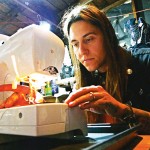The 40ish Frenchman whips out a white iPhone that color-matches his shirt and close-cropped hair. He has just instructed everyone in the house to gather round as he snaps a photo of the living-room wall. It’s a dreadful picture, but that’s not the point.
Jean-Francois Catz, with the help of fellow tech entrepreneur Wedge Martin, designed an app “this afternoon,” and the dinner party of more than a dozen will now be its beta testers. Standing back a few feet, one can make out the image of a window sill on the phone until suddenly a new photo pops onto the screen. It’s a picture of one of Catz’ friends from days earlier, hanging out in the exact same location.
Using the phone’s geo-location and photo-recognition coding, Catz explains to the gathering, his camera has just retrieved photos that correspond to others found on his friends’ social media profiles.
“It actually took us four days” to build, Martin admits while sipping on wine in the back of the room. But that’s not the point, either.
A few blocks off the 101 freeway in Mountain View, a home that can accommodate two families of four is quietly accepting foreign entrepreneurs who hope to measure the pulse of Silicon Valley and capitalize on lessons learned. They have come from Brazil, Japan, Israel, France and farther, all in an effort to immerse themselves in a month-long program that fosters startups.
This is SiliconHouse, the new melting pot for entrepreneurs and idea men. It is part training ground, part hostel, part portal to the most technologically advanced area in the world, and it’s one hell of a party when the bottles are uncorked.
“To come here, they have to have a platform, a business, a website,” Andrea Litto, one of SiliconHouse’s co-founders, says about the guests, who apply for limited spots. “But once they leave here, they usually have one or two more ideas, opportunities.”
Like many notable startups to sprout in Silicon Valley, the idea for SiliconHouse was born out of foreign perspectives and the realization that daily routines can be monetized.
Not long after coming to the Bay Area in mid-2011, Henrique Setton, 30, started a website with tips on how to make it in Silicon Valley. He had a background in banking and engineering, but finances weren’t fulfilling. Raquel Costa, a fellow native of Brazil, saw the site and reached out to him, as well as introduced Setton to Litto, a personal chef and caterer who also hailed from Sao Paulo.
Litto, who is married to Martin, an ironic bearded chap who started his first company at 19 and gained notoriety by co-founding Badgeville, says the idea for SiliconHouse came from years of cooking dinners for her and Martin’s tech friends. Startup ideas were passed around in equal measure to her dishes, and over time she realized there was a market for bringing together ambitious, likeminded individuals.
“I would do dinners four times a week and people said, ‘Oh, what about this idea or that?’” Litto recalls. “Why not make that a business?”
All over the world, entrepreneurs crave the success that seems so prevalent in Silicon Valley, the 21st-century land of opportunity, and yet these people need a hub. SiliconHouse, the first of many to come, according to Setton, fills that need.
With enough rooms to house eight guests at a time, the spacious wood-floored home features an open living room, dining room and kitchen, as well as a workspace for a table of eight to connect to the two different Wi-Fi networks. A patio wraps around the well-lit home, which is directly next door to where Litto and Martin live.
Catz, one of more than a dozen people nibbling on cheese and bread while waiting for Litto’s chicken capers, braised beef and walnut-pomegranate salad to be served, says he travels from his home in Provence, France to the Bay Area for work three to four times a year. After he applied and was accepted to SiliconHouse, which launched in October, he realized how much he had missed in regards to networking and developing ideas.
“Other times I was here, I stayed in a hotel, and I didn’t know how much time I was wasting,” says Catz, who in addition to his newly designed photo app is working on a personalized wiki app for iOS that will streamline and synchronize documents for project managers.
While everyone at SiliconHouse seems in good spirits, there is a noticeable, albeit slight, difference between the guests who are new and those who have been in the house for weeks.
It’s natural, Setton says, for new guests to slow-play their startup concepts when they first arrive. “When they come here they’re all afraid someone’s going to steal their idea,” Setton admits with a smile. It doesn’t last long, Catz says.
“We’re friends. We need to help each other. Because the day you make money,” he says, pausing with a twinkle in his eye, “you’ll remember me.”
The camaraderie, however, does come at a price. A four-week stay at SiliconHouse costs $3,600. (Up to half of the cost can be covered by a sponsorship.) Included in the package is boarding, daily breakfasts, a ridiculously tasty dinner party hosted by Litto each week, seminars around the Bay Area that are specifically identified for each particular applicant and a weekly guest speaker at the house.
Anderson Silva, 27, was part of the first class to attend SiliconHouse. His company, Qual Canal, analyzes commentary and trends related to television shows on Twitter and other social media sites. The company then provides feedback loops to TV producers and advertisers looking to harness viral campaigns.
Silva, a boisterous young man with rimmed glasses and dreadlocks, came to SiliconHouse as part of the 500 Startups program, which acts as an accelerator for early-stage tech companies.
Setton says that there is confusion at times about SiliconHouse’s mission. “We’re not an accelerator or an incubator,” he explains. “We’re a business hub.”
Awareness of the house to date has grown exclusively through word of mouth, social media and the company’s website, according to Setton. With almost 600 likes on Facebook, though, limited numbers of people are clearly having an exponential impact on its popularity.
“They get bitten by the Silicon Valley bug,” Setton says.
 Sid Enck shows for South First Fridays
Sid Enck shows for South First Fridays  San Francisco Bulls to Play Game at HP Pavilion
San Francisco Bulls to Play Game at HP Pavilion 


